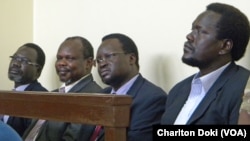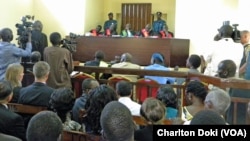JUBA —
The treason trial began Tuesday in Juba of four political detainees accused of attempting to overthrow the government in mid-December.
Heavily armed soldiers and police were deployed inside and outside the packed courthouse in Juba where the trial got under way.
Dressed in suits, the four -- former SPLM Secretary General Pagan Amum Okiech, former Security Minister Oyay Deng Ajak, former Deputy Defense Minister Majok D'Agot Atem, and former envoy of the semi autonomous Southern Sudan government to the US, Ezekiel Lol Gatkuoth -- looked calm as the prosecution outlined the case against them.
The four were among 11 political figures who were taken into custody shortly after fighting erupted in Juba on Dec. 15, in what President Salva Kiir has said was a failed bid to oust him, led by his former deputy, Riek Machar.
James Mayen, the lead prosecutor in the case, told the court he has enough evidence to prove the suspects attempted to overthrow the government.
In addition to treason, the four are accused of inciting the masses, subverting a constitutional government, insurgency, causing disaffection among the police and the army, publishing or communicating false information and undermining the authority of or insulting the president.
Mayen cited as a key piece of evidence to indicate treason had been committed a press release that Machar issued days before violence erupted in Juba in mid-December.
In the release, Machar and other political figures accused Kiir of having dictatorial tendencies and of making decisions without consulting other SPLM officials.
Mayen said he also has an audio recording of a conversation between the suspects on the night violence broke out in Juba, which showed that Machar had ordered soldiers to break into the armory and take back the guns that they had been ordered to hand over.
Mayen said Machar, Taban Deng Gai -- who is the lead negotiator for the anti-government side at peace talks in Addis Ababa -- and Alfred Ladu Gore will be tried when they are apprehended. All three either went into hiding or left South Sudan when the trouble erupted.
Mayen requested that the hearing be closed to the public, citing the sensitivity of the case.
While the morning session was open to journalists, security personnel barred reporters from entering the courtroom during the afternoon session.
Heavily armed soldiers and police were deployed inside and outside the packed courthouse in Juba where the trial got under way.
Dressed in suits, the four -- former SPLM Secretary General Pagan Amum Okiech, former Security Minister Oyay Deng Ajak, former Deputy Defense Minister Majok D'Agot Atem, and former envoy of the semi autonomous Southern Sudan government to the US, Ezekiel Lol Gatkuoth -- looked calm as the prosecution outlined the case against them.
The four were among 11 political figures who were taken into custody shortly after fighting erupted in Juba on Dec. 15, in what President Salva Kiir has said was a failed bid to oust him, led by his former deputy, Riek Machar.
James Mayen, the lead prosecutor in the case, told the court he has enough evidence to prove the suspects attempted to overthrow the government.
In addition to treason, the four are accused of inciting the masses, subverting a constitutional government, insurgency, causing disaffection among the police and the army, publishing or communicating false information and undermining the authority of or insulting the president.
Mayen cited as a key piece of evidence to indicate treason had been committed a press release that Machar issued days before violence erupted in Juba in mid-December.
In the release, Machar and other political figures accused Kiir of having dictatorial tendencies and of making decisions without consulting other SPLM officials.
Mayen said he also has an audio recording of a conversation between the suspects on the night violence broke out in Juba, which showed that Machar had ordered soldiers to break into the armory and take back the guns that they had been ordered to hand over.
Mayen said Machar, Taban Deng Gai -- who is the lead negotiator for the anti-government side at peace talks in Addis Ababa -- and Alfred Ladu Gore will be tried when they are apprehended. All three either went into hiding or left South Sudan when the trouble erupted.
Mayen requested that the hearing be closed to the public, citing the sensitivity of the case.
While the morning session was open to journalists, security personnel barred reporters from entering the courtroom during the afternoon session.









